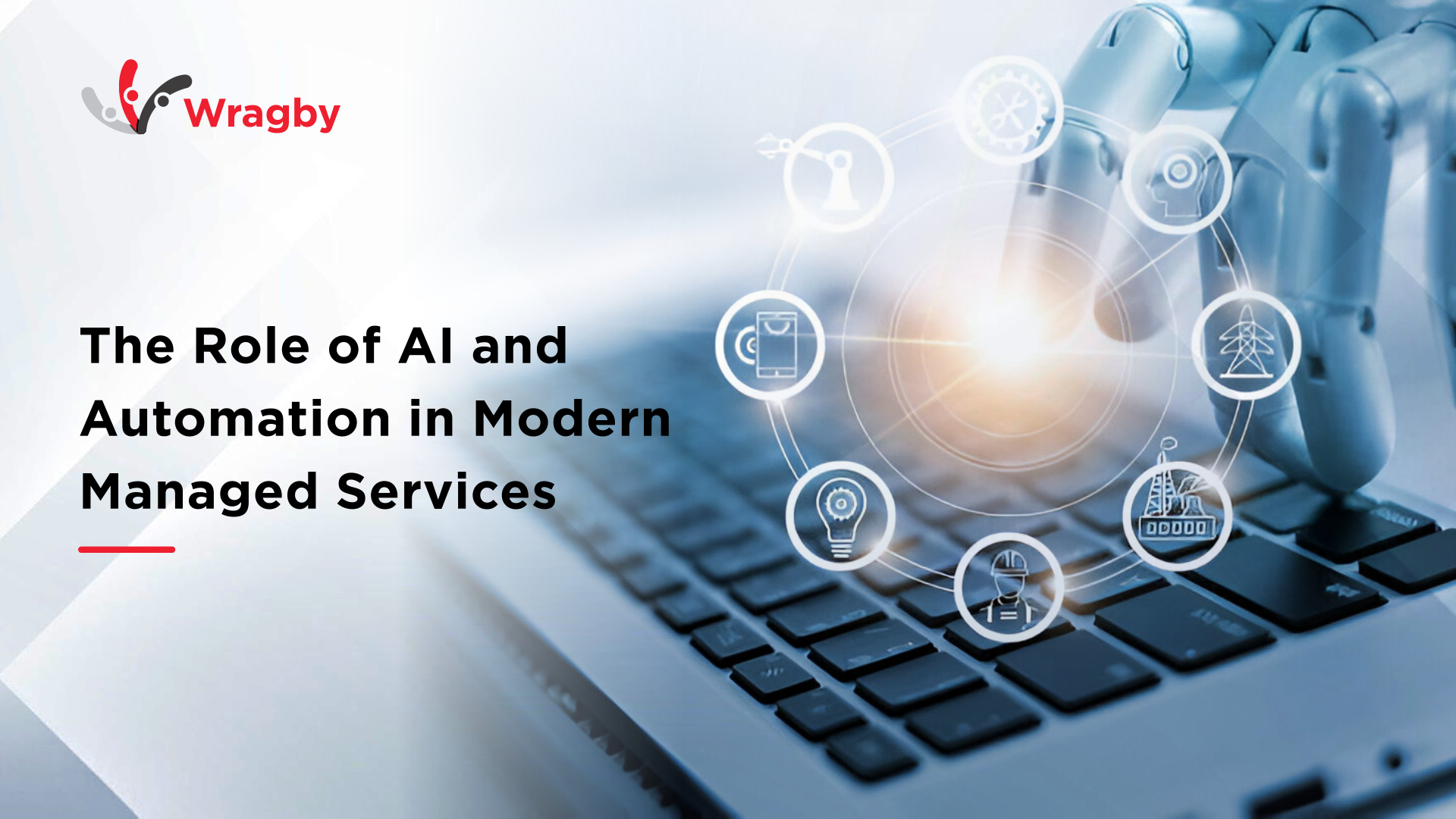
The Role of AI and Automation in Modern Managed Services
Introduction – A New Era for Managed Services
Managing IT today is nothing like it was a decade ago. Systems are more complex, threats are more frequent, and businesses expect things to run smoothly 24/7. The pressure on IT teams and by extension, managed service providers is intense.
That’s why AI and automation are becoming essential. They’re helping MSPs move from just reacting to problems to preventing them before they happen. Whether it’s spotting issues early, responding faster, or freeing up teams from repetitive tasks, AI and automation are quietly changing how IT support works behind the scenes.
For businesses, this shift means better service, fewer downtimes, and more time to focus on what actually drives growth.
Understanding AI and Automation in the IT Context
Before diving deeper, it helps to get clear on what AI and automation really mean in the world of managed services—beyond the buzz.
What is AI in Managed Services?
In simple terms, artificial intelligence (AI) refers to systems that can learn from data and make decisions without needing to be explicitly programmed for every scenario. In the managed services space, AI tools can analyze massive amounts of IT data to detect patterns, predict outages, or even recommend solutions fast.
Think of tools like IBM Watson AIOps or Microsoft Azure AI. They help service providers spot anomalies, respond to issues faster, and reduce downtime all with minimal human intervention.
AI isn’t replacing people, it’s helping them work smarter.
What Does IT Automation Mean?
IT automation is about streamlining repetitive and time-consuming tasks like system updates, backups, ticket routing, or even restarting failed services. Instead of a technician manually fixing something, automated workflows do it instantly.
Platforms like Ansible or ServiceNow are popular in this space. They allow service providers to create rules and processes that run automatically, cutting delays and improving consistency.
Together, AI and automation turn managed services from a reactive model into a proactive, intelligent one. And that shift is what’s setting modern MSPs apart.
Key Areas AI and Automation are Transforming Managed Services
AI and automation aren’t just add-ons—they’re changing the way managed services are delivered from the ground up. Here are a few areas where their impact is already being felt:
Proactive Monitoring and Predictive Maintenance
Gone are the days when IT teams would wait for something to break before jumping into action. With AI, MSPs can now monitor systems continuously and predict issues before they disrupt operations.
Tools like Dynatrace and LogicMonitor use machine learning to detect early signs of failure, performance drops, or unusual behavior—allowing service providers to step in early and prevent downtime.
Intelligent Service Desk Operations
AI-powered service desks are changing the way support tickets are handled. Virtual agents and chatbots can now respond to common queries instantly, while automation routes tickets to the right technician without delay.
Solutions like Freshservice and Zendesk AI are leading this shift, improving response time and user experience across the board.
Enhanced Security and Threat Detection
Security threats are evolving fast, and manual monitoring simply can’t keep up. AI-based cybersecurity platforms such as CrowdStrike and Darktrace—scan for threats in real-time and trigger automated responses to contain them.
For MSPs, this means offering more resilient, always-on protection to their clients.
Cloud Infrastructure and Workflow Automation
Whether it’s scaling cloud resources during peak usage or backing up systems overnight, automation handles tasks that would otherwise take hours. Platforms like Microsoft Azure Automation and AWS Systems Manager allow MSPs to run complex workflows with minimal manual effort.
This kind of automation ensures consistency and reduces the risk of human error.
Cost Optimization and Efficiency Gains
Perhaps one of the biggest wins is operational efficiency. With AI and automation handling routine tasks, IT teams are free to focus on more strategic work. Fewer errors, faster resolutions, and reduced overhead mean MSPs can deliver more value—often at a lower cost.
Benefits of AI-Driven Managed Services
When AI and automation are built into managed services, the difference is clear not just for service providers, but for the businesses they support. Here’s what this transformation unlocks:
1. Better Reliability and Uptime
AI helps predict and prevent issues before they escalate. That means fewer outages, faster fixes, and more reliable systems. Businesses can stay focused on work not worrying about whether their IT will hold up.
2. Faster Resolution Times
With intelligent ticket routing, auto-remediation, and real-time monitoring, problems are detected and resolved faster than ever. This saves time for both technicians and end users, improving satisfaction across the board.
3. Reduced Operational Costs
By automating routine processes and reducing the need for manual intervention, MSPs can cut costs without cutting corners. These savings can then be passed on to clients or reinvested in better tools and talent.
4. Stronger Security Posture
AI doesn’t sleep. It constantly scans systems for unusual activity and can trigger instant responses to potential threats. For clients, this means stronger protection without the need for constant oversight.
5. Smarter Insights and Reporting
With AI handling data analysis, MSPs can offer deeper insights into system performance, usage patterns, and potential risks. Dashboards and reports are clearer, faster, and more actionable making it easier for businesses to plan ahead.
Challenges and Considerations
While the benefits of AI and automation in managed services are clear, the road to adoption isn’t always smooth. Like any powerful technology, they come with their own set of challenges that MSPs and businesses need to keep in mind.
1. Data Privacy and Ethical Concerns
AI systems rely heavily on data—and lots of it. That means managed service providers must handle sensitive information with care. Issues around data privacy, transparency, and ethical AI usage are increasingly important, especially in industries like healthcare or finance where compliance is strict.
2. Integration with Legacy Systems
Not every organization runs on modern infrastructure. Many still rely on older systems that aren’t easily compatible with newer AI-driven tools. Integration challenges can delay implementation or limit the benefits of automation unless there’s a solid transition plan.
3. Skills Gap and Workforce Readiness
AI doesn’t eliminate the need for people, it changes what they need to know. Service providers must invest in training teams to work with intelligent tools, manage automation scripts, and interpret AI-driven insights. Without the right talent, the tech won’t deliver its full value.
4. Overdependence on Automation
While automation increases efficiency, it shouldn’t replace human judgment entirely. Certain situations still require a person to step in, especially when handling nuanced decisions or customer-sensitive issues. It’s about striking the right balance.
Real-World Examples of AI in Managed Services
The shift to AI-driven managed services isn’t just a theory—it’s already happening across industries. Here are a few examples of how companies and MSPs are putting AI and automation to work:
IBM and AIOps with Watson
IBM Watson AIOps is helping enterprises manage their complex IT environments by using machine learning to correlate logs, monitor performance, and pinpoint the root cause of issues in real time. One telecom giant reportedly reduced their mean time to resolution (MTTR) by over 80% after adopting Watson AIOps.
HCLTech’s DRYiCE Platform
Global IT services provider HCLTech uses its AI-based DRYiCE platform to automate routine infrastructure management and improve service delivery. The platform includes AI-powered virtual assistants, predictive analytics, and workflow automation that have helped clients reduce ticket volumes by up to 30%.
ServiceNow for Automated IT Workflows
ServiceNow enables organizations to automate IT workflows from incident response to asset management. One example is a U.S.-based healthcare company that used ServiceNow to automate 70% of its IT requests, freeing up its support team to focus on higher-priority tasks.
Darktrace for Cybersecurity
AI-powered cybersecurity firm Darktrace uses machine learning to detect threats that traditional security tools might miss. It analyzes network behavior and flags anomalies before they turn into breaches—giving MSPs and in-house teams a major edge in response times.
Azure AI and Intelligent Cloud Management
Companies managing hybrid cloud environments have turned to Microsoft Azure AI for intelligent recommendations on cost optimization, workload balancing, and performance tuning. Azure’s built-in automation also reduces manual input, making large-scale cloud management more efficient.
What the Future Holds for Managed Services with AI
We’re only scratching the surface of what AI and automation can do in managed services. As these technologies evolve, they’ll continue to reshape how businesses manage, secure, and scale their IT environments.
1. Predictive Everything
Today, predictive maintenance is a big win. But soon, we’ll see AI anticipating capacity needs, forecasting security threats, and even predicting user behavior. The goal? Less guesswork, more precision.
Platforms will grow smarter, not just fixing issues but preventing them days or even weeks before they happen. This proactive approach will become the new standard.
2. The Rise of Autonomous Operations (AIOps)
We’re heading toward a future where AIOps (Artificial Intelligence for IT Operations) plays a central role. In this model, AI doesn’t just assist—it takes the lead. Systems will automatically monitor, analyze, and resolve incidents without human input, creating near self-managing environments.
This shift won’t eliminate IT roles but will elevate them, freeing up teams to focus on strategy, innovation, and user experience.
3. Hyperautomation Across the Stack
Hyperautomation—using advanced technologies to automate as many processes as possible is already gaining traction. Expect to see tighter integrations between AI, robotic process automation (RPA), low-code platforms, and traditional IT automation tools. MSPs who embrace this trend will deliver faster, leaner, and more agile services.
4. More Accessible AI
Finally, AI will become more accessible. No-code AI tools, pre-trained models, and AI-as-a-Service platforms will allow even small MSPs to compete with larger players—lowering the barrier to entry and expanding what’s possible for everyone.
AI and automation aren’t just trends they’re fast becoming the foundation of how managed services operate. For service providers, it’s a chance to deliver smarter, faster, and more scalable solutions. For businesses, it means more reliable IT, stronger security, and better support without the heavy lift.
Of course, the transition requires thoughtful planning. It’s not just about adopting new tools—it’s about rethinking how services are delivered, how teams work, and how value is created for clients.
But one thing’s clear: MSPs that embrace this shift early will have a real advantage in a crowded market.
Now’s the time to explore how AI-driven managed services can support your business growth. Whether you’re upgrading internal systems or partnering with a forward-thinking provider, the future of IT management is intelligent and it’s already here.
Wragby – Modern Managed Services for Africa’s Growing Businesses
At Wragby, we help businesses across Africa simplify and scale their IT operations with intelligent managed services powered by automation, AI, and deep industry expertise.
As a trusted managed service provider (MSP), we don’t just keep your systems running, we help you evolve them. From infrastructure management and security monitoring to cloud optimization and service desk support, our solutions are designed to reduce downtime, enhance security, and give you better visibility across your entire IT environment.
What We Offer:
Proactive IT Monitoring & Support – We identify and resolve issues before they affect your operations.
Cloud & Hybrid Infrastructure Management – Whether you’re fully on cloud or managing a hybrid setup, we help you get the best performance and value.
AI-Driven Automation – Our automation capabilities streamline routine tasks, freeing up your teams to focus on strategic goals.
24/7 Service Desk & Incident Response – Our expert support team is always on, ensuring your business never skips a beat.
Security & Compliance – From threat detection to compliance management, we keep your data and systems protected.
With our presence in Nigeria and expanding operations across Africa, we’re committed to helping businesses grow smarter—leveraging technology to drive real results.
Frequently Asked Questions
What is AI in managed services?
AI in managed services refers to the use of artificial intelligence to monitor, manage, and optimize IT systems. It helps automate tasks, predict issues, and improve service delivery.
How does automation benefit IT operations?
Automation reduces the need for manual intervention by streamlining repetitive tasks like system updates, backups, and ticket routing—leading to faster and more efficient IT operations.
Can AI improve cybersecurity for businesses?
Yes. AI-powered tools can detect and respond to threats in real time, identify unusual behavior, and provide proactive security measures that help businesses stay protected.
What are AIOps in managed services?
AIOps (Artificial Intelligence for IT Operations) is a practice that uses AI and machine learning to automate and enhance IT operations, from monitoring to incident response.
Why choose a managed service provider like Wragby?
Wragby offers AI-driven, scalable IT support tailored for businesses in Africa. From cloud management to security and automation, we help businesses stay ahead with smarter technology.



Leave a Reply